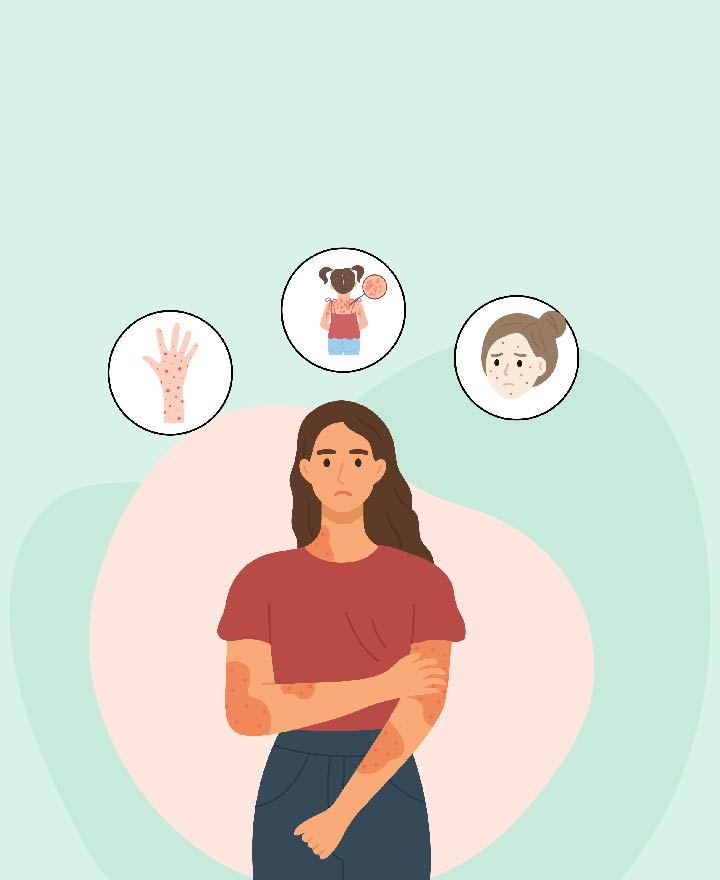

All You Need to Know About Cholinergic Urticaria
Cholinergic Urticaria (CU) is a type of physical (inducible) urticaria caused due to your body’s allergic reaction to chemicals produced by your nervous system, along with increased body temperature and excessive sweating. In most cases, these allergic reactions are harmless, and the hives normally go away within 30-120 minutes on their own. Read on to learn more about this condition.
What is Cholinergic Urticaria?
Cholinergic Urticaria (CU) is a skin reaction that occurs when your body heats up, causing tiny red bumps or hives, often accompanied by burning or stinging sensations. It’s most often triggered by things that make you sweat, like exercise, hot showers, stress, or spicy food.
People aged between 10 and 30 are more prone to CU than others. Mostly, this skin condition improves as you age. In some rare cases, it may lead to a few health complications as well. However, there is no need to panic. The smart thing to do for such situations is to be prepared beforehand and buy health insurance well in advance. This ensures that you can easily get the medical attention you need without worrying about the cost.
Symptoms
Here are some of the early cholinergic urticaria symptoms you need to watch out for:
• Elevated red spots on your body, especially on your arms, face, upper back and chest
• Itchy and tingling sensations on the red spots
• Red spots formed around a broader area of redness in the skin (erythema)
• Tiny, red spots on the skin within 5 to 6 minutes of exposure to heat or sweat
• Warm feeling when touching the red spots
• Diarrhoea
• Increased saliva production
• Dizziness
• Headaches
• Palpitations
• Reduced blood pressure
• Wheezing or respiratory issues
• Abdominal cramps
In serious cases, symptoms may include:
• Development of hives all over
• Swelling of the skin near the face and lips, leading to blocked airways in some cases
• Difficulty breathing due to bronchospasm
• Low blood pressure (hypotension)
• CU with exercise-induced anaphylaxis, causing difficulties in breathing
In the initial stages, these hives may go off on their own after 30 minutes. However, for some people, the hives may fade off after an hour or two.
Causes and Risk Factors
The reason it happens is because when your body temperature increases, it stimulates the nervous system to release acetylcholine, which causes sweating. In people with cholinergic urticaria, this sweating process triggers an allergic-like response, leading to histamine release and hive formation. Other CU triggers include:
• Hot showers
• Fever
• Physical exertion from exercise
• Exposure to very hot climate conditions
• Wearing a tight bandage for extended hours
• Spicy foods
• Anxiety, anger, nervousness and other emotions that cause you to sweat profusely
According to experts, you are at a higher risk of cholinergic urticaria caused by heat and sweat if you have:
• Hay fever
• Asthma or respiratory issues
• Chronic skin conditions like eczema
• Profuse sweating, a condition known as hyperhidrosis
• History of hives or CU in the family
Diagnosis
When you seek medical help for an allergic reaction heat rash, doctors follow these diagnostic procedures to rule out other skin conditions and confirm if it is CU:
• Checking with you on how you feel in the affected areas
• Exercise tests, in which they induce sweating in your body through a series of intense physical routines
• Methacholine injections to check your body’s tolerance levels to acetylcholine and other cholinergic substances
• Passive warming tests, in which they increase your body temperature through hot showers or by exposing you to a sauna-like atmosphere
Treatment
Usually, the treatment methods followed includes:
• Antihistamines to control allergies
• Steroids or Histamine 2 Receptor Blockers
• Leukotriene Inhibitors
• Immunosuppressants
• Beta-blockers, such as Propranolol
• Anti-IgE monoclonal antibodies, such as Omalizumab
• Anabolic Steroids, such as Danazol
• Medicines to control asthma
• Medicines to control blood pressure
• Medicines to reduce sweat production
• Stress Management Treatments
• Phototherapy using ultraviolet rays
• Lifestyle changes (refraining from anything that increases body temperature or sweat production, avoiding spicy foods, quitting alcohol, etc).
Prevention Tips
While it may not be possible for you to completely avoid exposure to heat or sweating, you can try the following measures to reduce your risk of CU:
• Staying away from hot and spicy foods
• Engaging in outdoor exercise routines when it is not too hot (preferably early morning or late evening hours)
• A healthy lifestyle with effective stress management techniques
• Refraining from hot showers, hot baths or saunas
• Wearing comfortable, moisture-absorbing clothes
• Keeping your home temperature cool
Conclusion
Cholinergic Urticaria forms hives/red bumps on your skin due to your body’s allergic reactions. Though the exact reason for this condition is not identified yet, an increase in body temperature, hot climate and profuse sweating are the main triggers. If these symptoms don’t go away even after a week, you should seek medical help. In most cases, antihistamines and other medications can treat this condition.
However, in rare cases, these hives could also lead to life-threatening conditions like anaphylaxis, bronchospasm and more. Managing such medical emergencies can be expensive. Therefore, buy health insurance policy to safeguard your finances in the long run. With the right coverage, you can be financially protected against the costs of hospitalisation, treatment, medications, and other related expenses.
One of the important components of our overall wellness is also being financially secured. Healthcare emergencies can happen any time, but a good health insurance policy can protect you from such uncertain situations. To know more about Wellness and other health related tips, visit the wellness corner.
Disclaimer: This blog provides general information and discussions about health and related subjects. The information and other content provided in this blog, website or any linked materials are not intended and should not be considered or used as a substitute for medical advice, diagnosis, or treatment. Kindly contact your doctor before starting a new medicine or health regime.
Related Articles
Schizophrenia – Everything You Should Know
Anxiety Disorder: Be Aware And Informed
Types of Seizures and Their Symptoms
Muscle Fatigue: Causes, Symptoms, and Treatment
Sleep Deprivation: What It Is, Symptoms, Treatment & Stages
Published on July 09, 2025















 Health Insurance
Health Insurance  Travel Insurance
Travel Insurance  Car Insurance
Car Insurance  Cyber Insurance
Cyber Insurance  Critical Illness Insurance
Critical Illness Insurance
 Pet Insurance
Pet Insurance
 Bike/Two Wheeler Insurance
Bike/Two Wheeler Insurance  Home Insurance
Home Insurance  Third Party Vehicle Ins.
Third Party Vehicle Ins.  Tractor Insurance
Tractor Insurance  Goods Carrying Vehicle Ins.
Goods Carrying Vehicle Ins.  Passenger Carrying Vehicle Ins.
Passenger Carrying Vehicle Ins.  Compulsory Personal Accident Insurance
Compulsory Personal Accident Insurance  Travel Insurance
Travel Insurance  Rural
Rural